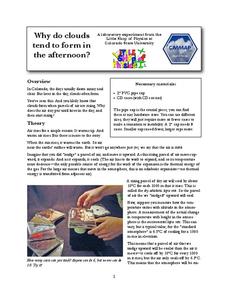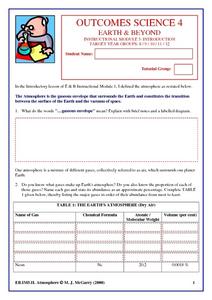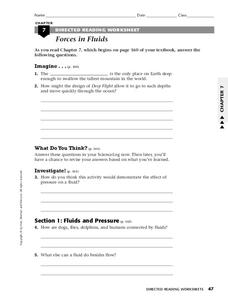Curated OER
Case Study of Local Trends in the Carbon Cycle
Students examine the relationship between chlorophyll and carbon dioxide in the atmosphere. In this investigative lesson students study the local effects of climate change.
Chicago Botanic Garden
Greenhouse Gas Emissions — Natural and Human Causes
What impact do humans have on greenhouse gas emissions? What are the natural causes of these gasses? Thanks to the carbon cycle, carbon dioxide eats away at the earth's atmosphere with the intensified help of humans. Young scientists...
Chicago Botanic Garden
Climate and Forest Ecosystem Services
Forests, through sequestration, capture excess carbon dioxide in our atmosphere and store it, aiding in climate change. The third installment in a four-part series on how climate impacts forests explores carbon sequestration....
Chicago Botanic Garden
Carbon, Greenhouse Gases, and Climate
Climate models mathematically represent the interactions of the atmosphere, oceans, land, sun, surface, and ice. Part two in the series of four lessons looks at the role greenhouse gases play in keeping Earth warm and has participants...
Chicago Botanic Garden
GEEBITT (Global Equilibrium Energy Balance Interactive TinkerToy)
Students use the GEEBITT excel model to explore how global average temperatures are affected by changes in our atmosphere in part two of this series of seven lessons. Working in groups, they discuss, analyze graphs, and enter data to...
Information is Beautiful
How Many Gigatons of Carbon Dioxide...?
Here is an interesting infographic that presents information on the amount of carbon dioxide we can safely release into the atmosphere compared to the actual amount we have released to date.
Colorado State University
Why Do Clouds Form in the Afternoon?
The stability of the atmosphere changes on a daily basis. A kinesthetic lesson models how the stability of the air changes as it's warmed by the sun. Learners connect their models to the changing air currents and movement of warm and...
Science 4 Inquiry
The Ins and Outs of Photosynthesis
The most important chemical process on Earth is photosynthesis. Scholars explore the changes in the gases in our atmosphere as life on Earth developed. They create a model of photosynthesis and consider simple questions.
PBS
Inventions
Use this lesson plan to discuss inventions that have changed your class's world and have impacted society. Middle schoolers investigate important inventions of their time and design an invention in a simulated business atmosphere. Modify...
Curated OER
Hurricane Research
Students examine the factors that influence hurricanes to develop. In this hurricane lesson students research atmospheric trends that affect hurricanes and create a summary.
Curated OER
Changing Planet: Ocean Acidification - the Chemistry is Less than Basic!
A video and laboratory investigation are highlights to this lesson plan on acidification of ocean water due to increased atmospheric carbon dioxide. Using bromothymol blue (BTB) as an indicator, pupils analyze the amount of carbon...
Curated OER
Pressure
Some very interesting details about the pressure of gases in our atmosphere are presented in this PowerPoint. Lists of facts about the various laws of gases are summarized and would be a great visual to use during a full lecture.
La Jolla High School
Setting--Painting the Background
Setting and description are important parts of John Steinbeck's novel Of Mice and Men. Ask your class to examine how he sets the scene with this graphic organizer. Individuals or groups look at several different aspects of the setting in...
Laboratory for Atmospheric and Space Physics
Explore Saturn and Titan with Spectral Data
Titan is Saturn's largest moon and has its own atmosphere. An attention-grabbing tutorial allows learners to analyze the spectrum of Saturn and Titan to determine their elemental compositions. Scholars compare a known element's spectrum...
Space Awareness
Oceans as a Heat Reservoir
Oceans absorb half of the carbon dioxide and 80 percent of the greenhouse gases released into the atmosphere. Scholars learn how and why the oceans store heat more effectively than land and how they help mitigate global warming. Pupils...
Curated OER
Poetic Elements
Poetry is all about sound and rhythm. The sound of the words, the rhythm of the lines, and the emotional atmosphere created by these elements and the literary devices poets use, compress whole stories into a few stanzas. The specialized...
Population Connection
The Carbon Crunch
Carbon is in the air; should we care? Teach the class why it is important to pay attention to carbon levels and how the world population and various countries across the globe affect the carbon levels in the atmosphere. High schoolers...
Curated OER
Earth and Beyond
In this earth and beyond worksheet, learners answer short answer questions about the atmosphere, the chemical compounds in Earth's atmosphere. Students visit different websites to conduct research of the discoveries of the scientist who...
Curated OER
Mission Planning: Earth/Mars Comparisons
Students compare and contrast conditions on Mars to those on our own planet, specifically, their local or regional environments. The physical characteristics, the atmosphere, and other astronomical data is considered.
Curated OER
Forces in Fluids
In this forces in fluids worksheet, students answer questions as they relate to forces in fluids. Students complete a chart about atmospheric pressure.
Curated OER
Wind Dynamics and Forests
Young scholars perform experiments to explore differences in wind speed and forest density. Through experimentation and observation, students realize that changes in vegetation affect the atmosphere and wind conditions. They create a...
Curated OER
Clean Air
Students observe gas molecules in the atmosphere absorbing the light that goes through them.
Curated OER
Creating and Analyzing Graphs of Tropospheric Ozone
Students create and analyze graphs using archived atmospheric data to compare the ozone levels of selected regions around the world.
Curated OER
Plants Releasing Water
Third graders investigate how water is released from different plants into the atmosphere. They observe and investigate two types of plants with domed lids with condensation and communicate those observances and inquiries on an in-class...

























